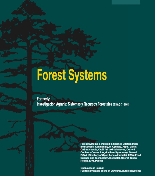
Forest Systems
Scope & Guideline
Transforming insights into action for forest sustainability.
Introduction
Aims and Scopes
- Agroforestry Systems Research:
The journal emphasizes research on various agroforestry systems, which combine agriculture and forestry practices to optimize land use, improve biodiversity, and enhance ecosystem services. - Sustainable Land Management:
A core aim is to promote sustainable land management practices that enhance soil health, increase productivity, and mitigate climate change through integrated approaches. - Biodiversity and Ecosystem Services:
The journal focuses on the role of biodiversity in agroforestry systems and how these systems contribute to ecosystem services, including carbon sequestration, water regulation, and habitat provision. - Socioeconomic Aspects of Agroforestry:
Research often includes the socioeconomic dimensions of agroforestry, exploring farmer adoption, economic viability, and the social implications of integrating trees into farming systems. - Climate Change Mitigation and Adaptation:
The journal addresses how agroforestry practices can serve as effective strategies for climate change mitigation and adaptation, enhancing resilience in agricultural landscapes.
Trending and Emerging
- Climate-Smart Agriculture:
Recent publications increasingly focus on climate-smart agricultural practices, emphasizing the integration of agroforestry techniques that enhance resilience to climate change and promote sustainable food production. - Digital Tools in Agroforestry:
The use of digital tools and technologies, such as remote sensing and machine learning, is gaining traction for monitoring and managing agroforestry systems, indicating a trend towards data-driven approaches in research. - Holistic Approaches to Soil Health:
There is a growing emphasis on holistic approaches to improving soil health through agroforestry practices, including the use of cover crops, organic amendments, and agroecological principles. - Ecosystem Services Valuation:
Emerging research trends include the valuation of ecosystem services provided by agroforestry systems, highlighting their economic, social, and environmental benefits to encourage wider adoption. - Participatory Research and Community Engagement:
There is an increasing focus on participatory research methodologies that engage local communities in agroforestry practices, reflecting a trend towards inclusive and stakeholder-driven approaches.
Declining or Waning
- Traditional Forestry Practices:
There has been a noticeable decline in research focused solely on traditional forestry practices. The shift towards integrated agroforestry systems suggests a waning interest in studying forestry in isolation from agricultural practices. - Single-Crop Systems:
Research on single-crop agricultural systems is decreasing as there is a growing recognition of the benefits of diversification and intercropping, leading to a reduced focus on monocultures. - Conventional Livestock Management:
With the rise of silvopastoral and integrated livestock systems, conventional livestock management practices are receiving less attention, indicating a transition towards more sustainable and innovative livestock integration. - Pesticide Use in Agroecosystems:
Research on the use of chemical pesticides in agroecosystems appears to be declining, as agroecological practices and integrated pest management strategies gain prominence in sustainable agriculture discussions.
Similar Journals

Madera y Bosques
Advancing Sustainable Forestry PracticesMadera y Bosques is a prominent academic journal specializing in the fields of forestry and wood science, published by INST ECOLOGIA A C in Mexico. With an ISSN of 1405-0471 and an E-ISSN of 2448-7597, it has established itself as a vital platform for disseminating research findings, innovative practices, and methodologies pertinent to sustainable forest management and ecological conservation. Operating since 2008, the journal covers a wide scope of topics related to the complexities of forest ecosystems, the importance of biodiversity, and the challenges posed by climate change. Despite its categorization in Q4 for the year 2023 in the Forestry category, Madera y Bosques aims to elevate discourse and practice in the field, providing a voice to emerging researchers and seasoned professionals alike. Additionally, the journal adheres to open access principles, enhancing the visibility and accessibility of its articles to a global audience. Researchers and practitioners are encouraged to engage with its rich content to further their understanding and impact in the world of forestry.

Journal of Forest Science
Empowering global forestry through open access.Journal of Forest Science, published by the Czech Academy Agricultural Sciences, serves as a pivotal resource in the field of forestry and soil science. With its ISSN 1212-4834 and E-ISSN 1805-935X, this Open Access journal has been delivering insightful research since 2003, making knowledge freely available to researchers and practitioners globally. Hailing from the Czech Republic, the journal has established a notable impact within the academic community, as evidenced by its placements in the Q2 quartile for Forestry and Q3 for Soil Science according to the latest rankings. This positions the Journal of Forest Science favorably within academic discourse, ranking #73 out of 174 in Forestry and #84 out of 159 in Soil Science on Scopus, placing it at the 58th and 47th percentiles respectively. Covering a wide range of topics that intersect with environmental sustainability, forest management, and ecological research, the journal aims to foster innovation and collaboration within the scientific community. Researchers, professionals, and students can access published articles easily, bolstering the advancement of knowledge in forest science and its related disciplines.

Forest Ecosystems
Empowering voices in the realm of forest science.Forest Ecosystems is a prestigious open access journal published by KEAI PUBLISHING LTD, dedicated to advancing knowledge in the fields of forestry, ecology, and conservation. Established in 2014 and located in Beijing, China, this journal has rapidly gained prominence, achieving Q1 status in multiple categories, including Ecology, Evolution, Behavior and Systematics, and Forestry in 2023. With an impressive rank of 19 out of 174 in the Scopus category of Agricultural and Biological Sciences - Forestry, it stands in the 89th percentile, reflecting its influential contributions to the field. The journal fosters scholarly discourse and disseminates innovative research aimed at understanding forest ecosystems and their vital role in our environment. Offering a robust platform for researchers, professionals, and students, Forest Ecosystems ensures accessibility through its open access format, enabling a wider audience to engage with and benefit from cutting-edge research dedicated to the stewardship of forest resources.
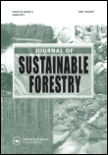
Journal of Sustainable Forestry
Connecting research and policy for sustainable forest management.Journal of Sustainable Forestry is a premier academic publication dedicated to advancing knowledge and practices in the field of sustainable forestry and environmental management. Published by Taylor & Francis Inc in the United Kingdom, this journal has been a cornerstone for researchers and professionals since its inception in 1992. With an impressive reputation, it boasts a 2023 Q2 ranking in Food Science, Forestry, and Geography, Planning and Development, highlighting its significant contribution to interrelated disciplines. The journal’s impact is further underscored by its Scopus ranking, especially in Forestry where it holds the 43rd position out of 174 publications, placing it in the 75th percentile. Although not open access, the journal remains committed to providing innovative research and practical insights into forest management, ecological sustainability, and policy development. As the field of sustainable forestry continues to evolve, the Journal of Sustainable Forestry serves as an essential resource for those committed to advancing sustainable practices globally, fostering a deeper understanding of how sustainable forestry can contribute to environmental resilience and biodiversity conservation.

AGROFORESTRY SYSTEMS
Pioneering insights in sustainable land management.AGROFORESTRY SYSTEMS, published by Springer, is a leading journal in the fields of Agronomy and Crop Science and Forestry. With an impressive impact factor and prestigious rankings—Q2 in Agronomy and Crop Science and Q1 in Forestry as of 2023—this journal occupies a vital niche in publishing high-quality research that intersects agricultural practices and forest management. The journal aims to advance the understanding of agroforestry practices, promoting sustainable land use and enhancing ecosystems worldwide. Operating since 1982, AGROFORESTRY SYSTEMS stands out with its rigorous peer-review process, ensuring the dissemination of significant scientific findings that contribute to both theoretical insights and practical applications. Although it does not currently offer open access, the journal continues to be accessible through various academic platforms, supporting researchers, professionals, and students in their pursuit of knowledge within this dynamic field.

Folia Oecologica
Connecting Global Scholars in Ecological Studies.Folia Oecologica is a distinguished open-access journal published by WALTER DE GRUYTER GMBH, focusing on critical research in the fields of agricultural and biological sciences, ecology, and forestry. Established as a vital platform for the dissemination of knowledge, this journal has been providing free access to its valuable content since 2017, catering to an international audience engaged in environmental and ecological studies. With its ISSN 1336-5266 and E-ISSN 1338-7014, Folia Oecologica has earned notable ranks in Scopus, placing it in the 62nd percentile for Agricultural and Biological Sciences and the 50th percentile for Environmental Science. The journal's commitment to high-quality research is reflected in its positions in the Q2 and Q3 quartiles across various categories in 2023. As it converges years from 2006 to 2024, Folia Oecologica continues to foster scholarly dialogue and collaboration among researchers, professionals, and students, making significant contributions to the understanding and preservation of our ecological systems.
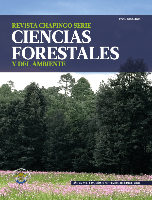
Revista Chapingo Serie Ciencias Forestales y del Ambiente
Fostering collaboration in the pursuit of ecological excellence.Revista Chapingo Serie Ciencias Forestales y del Ambiente, published by Universidad Autónoma Chapingo, serves as a prominent platform for scholars and practitioners in the fields of Ecology and Forestry. Established in 2001, this open access journal has made significant strides in disseminating research that addresses pressing environmental issues, particularly within the Mexican context. With an ISSN of 2007-3828 and E-ISSN of 2007-4018, it has been recognized for its contributions, earning a Q3 ranking in both Ecology and Forestry categories as of 2023. The journal is pivotal in fostering collaboration and knowledge exchange among researchers, professionals, and students dedicated to understanding and preserving forest ecosystems. Access to its rich content is unrestricted, enhancing visibility and impact for innovative research and practical applications in sustainable management and conservation practices.

Floresta e Ambiente
Fostering innovation in forestry and environmental science.Floresta e Ambiente is a pioneering open-access journal dedicated to advancing knowledge in forestry and environmental science, published by the Federal Rural University of Rio de Janeiro's Institute of Forests. Since its inception in 2012, this journal has emerged as a crucial platform for researchers, professionals, and students to disseminate innovative findings and foster discussions on sustainable forest management, conservation practices, and the ecological significance of forests in Brazil and beyond. With an impressive impact factor and a commendable ranking in the SCOPUS database, positioned in the 49th percentile of the Agricultural and Biological Sciences category, Floresta e Ambiente actively supports the dissemination of high-quality research while contributing to the global discourse on forestry. As an open access journal since 2013, it ensures that valuable knowledge is readily available to all, enhancing collaboration and engagement within the scientific community.
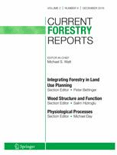
Current Forestry Reports
Navigating the future of forestry with groundbreaking findings.Current Forestry Reports, published by Springer International Publishing AG, stands at the forefront of forestry and ecological research, boasting an impressive array of quartile rankings in 2023 such as Q1 in Ecology and Forestry. With an ISSN of 2198-6436, this journal has emerged as a pivotal platform for disseminating innovative research findings and insights critical to the sustainable management of forest ecosystems. Operating out of Switzerland, it covers a broad scope that spans from ecological theory to practical forestry applications and landscape conservation. Notably, it ranks #3 out of 174 in Agricultural and Biological Sciences: Forestry and #4 out of 211 in Environmental Science: Nature and Landscape Conservation, reflecting its high impact and relevance in the field, placing it in the top percentiles in multiple categories. This open-access journal endeavors to provide a comprehensive understanding of contemporary issues, trends, and methodologies in forestry and related disciplines, making it an indispensable resource for researchers, practitioners, and students who are dedicated to advancing knowledge and practices in forest science.
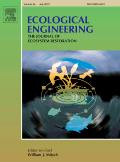
ECOLOGICAL ENGINEERING
Advancing sustainable solutions for a thriving planet.ECOLOGICAL ENGINEERING, published by Elsevier in the Netherlands, is a leading journal dedicated to advancing the field of environmental engineering and sustainable development. With an impressive impact factor and recognized as Q1 in multiple categories including Environmental Engineering, Management, Monitoring, Policy and Law, as well as Nature and Landscape Conservation, this journal stands at the forefront of environmental science research. It ranks among the top publications in its fields according to Scopus, reinforcing its significance with a notable position within the 90th percentile for Nature and Landscape Conservation. ECOLOGICAL ENGINEERING encourages open discourse and dissemination of innovative practices aimed at addressing contemporary ecological challenges, making it an essential resource for researchers, professionals, and students committed to sustainable practices and environmental stewardship. The journal’s comprehensive scope includes ecological restoration, habitat management, and policy implementation, ensuring a broad spectrum of relevant topics for its readership.